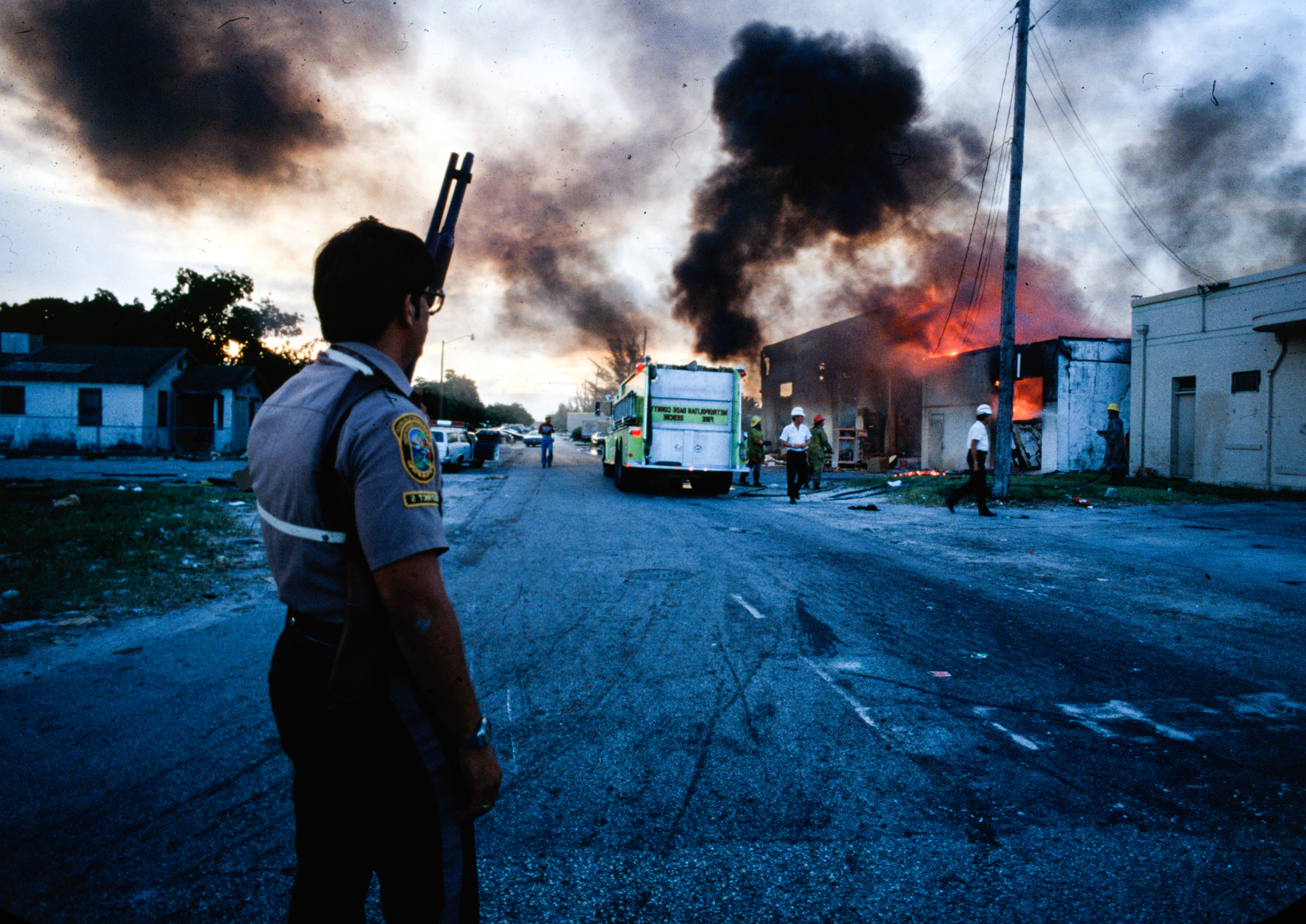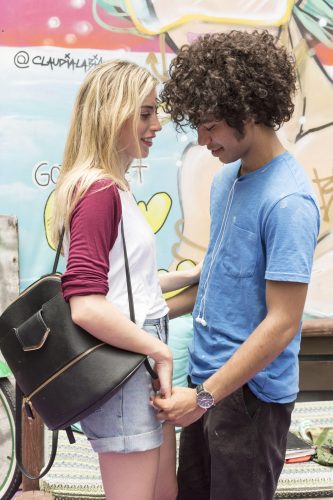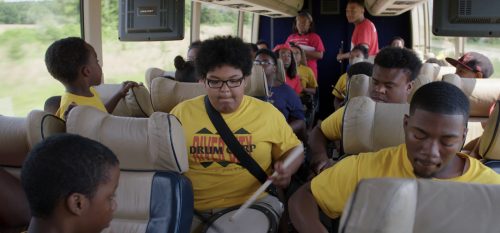Theater / Film
Miami Film Festival: Homegrown talent dedicated to telling S. Florida stories

“When Liberty Burns,” a documentary by Miami-based filmmaker Alexis Dudley, makes its world premiere at the Miami Film Festival. (Photo courtesy of Miami Film Festival)
There’s a community of filmmakers that is evolving and has put a stake in the ground in Miami – dedicated to staying put rather than leaving South Florida for New York or Los Angeles.
It’s a definite talking point this year surrounding Miami Dade College’s Miami Film Festival, said Jaie Laplante, executive director and director of programming for the annual event, which will run from March 6 through March 15.
“There are changes that have been happening in Miami,” said Laplante, who is in his 10th year as director and is an integral part of this Miami movement.
“[There is a] flourishing of creativity among Miami creators who are working in cinema, the global reach of Miami stories,” he added, emphasizing the attention to such films when “Moonlight” won the Academy Award for “Best Picture” in 2017. “There are some filmmakers in this community who are making organic stories and those from around the world that are recognizing the richness of South Florida stories. This year, too, there are about a dozen Miami-based filmmakers who are in the program that have made stories in other parts of the country.”
Two documentarians and a feature filmmaker, all from Miami, are the working example of Laplante’s statements of a resurgence in the film community – and how the city shapes their points of view from story to screen. Their films are “Reefa,” “When Liberty Burns,” and “River City Drumbeat.”
Jessica Kavana Dornbusch’s “Reefa” makes its world premiere at this year’s festival. The made-in Miami, feature-length film is based on the 2013 police Taser death in Miami Beach of 18-year-old graffiti artist Israel “Reefa” Hernandez.
Dornbusch grew up in Miami, graduated from North Miami Beach Senior High, left for Boston University’s film program, worked in New York in the independent film industry, and returned to Miami as an assistant director at television station Univision. Now, she concentrates entirely on made-in Miami films. Her first movie, 2006’s “Love and Debate,” originally written for Project Greenlight, was based on her experiences as a high school and college award-winning debater.
“I’m a Miami girl. All of my films have been based here, written for here, and I’ve shot them all here,” Dornbusch said.
Florida’s lack of tax incentives for filmmakers causes some hardships, she said. The state’s film tax credits launched July 1, 2010, and ended on June 30, 2016. Since then, bills have been introduced in the Florida Legislature, but so far, the incentives haven’t been re-instated.
Dornbusch said she had to stretch a small budget – a $1 million budget is relatively slight to produce a full-length feature – but the filmmaker insisted she had to create “Reefa” in Miami.
“Had we gone to Atlanta or someplace, that money would have gone a longer way with an incentive. But this is a Miami story, and it was important for us to shoot it here,” she said. “The family is here, Reefa lived here, and I wanted to shoot the film on the streets where he used to roam with his friends.”
Going into the making of the film, she knew that the tight-knit film community would step in, she said.
“Whatever incentive we didn’t have would be made up in so many ways here, being part of this film community and their help.”
“Reefa” could get a different kind of incentive if it wins in two competitions. It goes up against 11 other feature-length films for a $30,000 cash prize in the festival’s Knight-funded Made in MIA Award competition. The competition is looking for the film that features a “substantial portion of its content (story, setting and actual filming location) in South Florida … and that most universally demonstrates a common ground of pride, emotion, and faith for the South Florida community.”

Clara McGregor and Tyler Dean Flores in Wynwood in a scene from “Reefa.” (Photo courtesy of Gaston Suaya)
Dornbusch’s movie will also compete for the festival’s Knight MARIMBAS Award, an international competition that awards $40,000 to the film that “best exemplifies richness and resonance for cinema’s future.”
“We capture a side of Miami in ‘Reefa’ that is rarely seen on film,” Dornbusch said. “There’s the ‘Moonlight’ side that did an extraordinary job with everything that’s Liberty City and that raw beach side that still exists in Miami. There’s the commercial [side], the ‘Birdcage’ side, the music video side with the big helicopter shots of Ocean Drive and South Beach and the glitz and all of that.”
Then there’s the rest of Miami, she said, including “Wynwood and there’s a side of Overtown and the streets and underpasses and parks. We shot all over Key Biscayne. We found a beautiful color to paint the Miami landscape.”
Another world premiere, “When Liberty Burns,” is directed by North Miami’s Dudley Alexis. The documentary examines the 40th anniversary of the Arthur McDuffie race riots in Liberty City.
“There are a lot of people that don’t want to talk about it. But you go to Liberty City and you can see the effects of the riots are still there,” Alexis said.
He was inspired to make his second documentary – his first, “Liberty Soup,” explored his Haitian roots and a Haitian Independence Day tradition – from a personally felt incident that sparked his interest in researching policing in Miami. Junior Prosper, a 31-year-old cab driver, was killed in September 2015 in a police altercation.
“A friend of mine got into an altercation with a police officer on the highway and was shot by police and died,” he said.
Three years in the making, his documentary includes first-person stories, his interviews with McDuffie’s family and close friends, and tells a piece of history that, he says, “many people want to bury.”
“I hope to draw awareness to why there is a culture like this in Miami and why Liberty City remains the way it does today. Maybe it will draw interest for more investment in that neighborhood, which I don’t feel is happening,” he said.

Members of the River City Drum Corp head to a showcase in Evansville, Ind., in a scene from “River City Drumbeat.” (Photo courtesy of Owsley Brown Presents)
Documentarian Marlon Johnson sees parallels between how he grew up in Liberty City and the experiences of a group of high schoolers in Kentucky. He said he was able to draw on his own experiences for “River City Drumbeat.”
Johnson said he and co-director Anne Flatté were approached by producer/filmmaker Owsley Brown, who was born and raised in Louisville, about an African-American drum corps from a West Louisville neighborhood that thrives by being connected through music, art and the cultural traditions of their African ancestors.
The documentary follows the group’s founder, Edward “Nardie” White, who was retiring after three decades – and highlights his dedication to community drum corps and the training of his successor Albert Shumake, whose troubled life, much like Johnson’s story, was transformed by participating in the after-school arts program.
“I’m a Liberty City kid. And what a lot of ‘River City’ shows is the way the kids are like who I was. My life was saved by the arts, and a lot of these kids have the same story,” he said. “The opportunities I had to participate in performing arts programs growing up in Miami kept me, for lack of a better term, on the straight and narrow. Being part of that is a way to see the world through a different lens.”
Johnson never left Miami and went on to study film at the University of Miami.
“I wasn’t going to sew my seeds [as a filmmaker] in New York or L.A. I wanted to plant my roots right here.”
What: 37th Miami Film Festival
When/where: March 6-15 in theaters across the city; see complete schedule at miamifilmfestival.com/schedule
Cost: $13 for general admission; $12 for seniors; and $10 for Miami Film Society Members, students and veterans
More information: 844-565-MIFF (6433); 305-237-FILM (3456); miamifilmfestival.com
For more video commentary by Jaie Laplante, check out the website for Florida International University’s arts publication, Inspicio.
ArtburstMiami.com is a nonprofit source of theater, dance, visual arts, music and performing arts news. Sign up for our newsletter and never miss a story.
